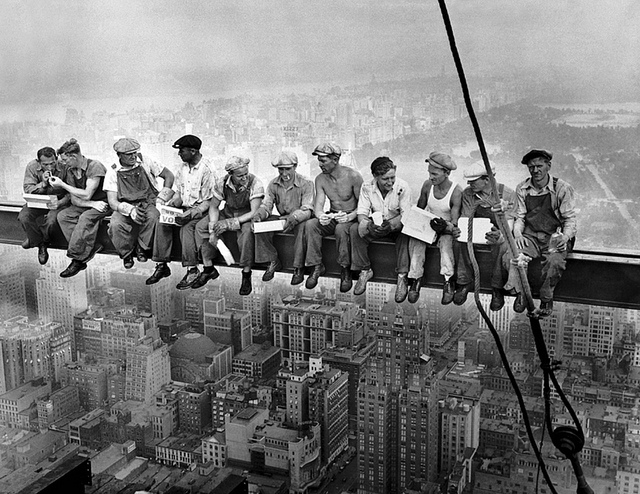“What is the origin of this monstrous machine that chews up beauty and spits out money?” ~ Charles Eisenstein
In my last post, I described what a relationship-centered paradigm of business would look like. In this article I am going to discuss some of the major problems of the business paradigm that most of us are used to: the profit-centered paradigm.
But first, what is a paradigm?
A paradigm is a pervasive system of assumptions and beliefs that profoundly influence the way we think, behave and perceive the world around us. We have so much information coming at us all the time that we cannot possibly process all of it. We use our assumptions and beliefs to filter our perceptions. Therefore, we are often unaware of our assumptions and beliefs, but rather view them as undisputed facts—as “just the way things are.”
We completely take these assumptions and beliefs for granted—just like the sky is blue or gravity—we don’t even think about them.
The assumptions underlying our paradigms are maintained by what is known as a confirmation bias. We only pay attention to information that supports our assumptions, while selectively ignoring and dismissing information that runs contrary to them. Moreover, we tend to act in ways that maintain those beliefs, which is known as a self-fulfilling prophecy.
Thus, a paradigm shift of any kind can only happen if we are willing to examine and question the conventional wisdoms that we take for granted.
The current business paradigm that most of us operate within is closely linked to the prevailing assumptions about human nature. As we will see, our entire economic system is based on the premise that human beings are fundamentally selfish and greedy, or in economists’ lingo: “rationally self-interested.” This is an assumption that is rarely questioned.
“Our present economy is strongly influenced by the minds of a few great thinkers on human nature … emphasizing self-interest as the basis of a free-market economy. … The modern economy now presumes that we are all fundamentally selfish and competitive. As a culture, we seem to draw the conclusion that even though it is good to be virtuous, human nature is greedy.
This becomes a self-fulfilling prophecy. When we see how the economy fosters and rewards individual and corporate greed, we conclude that acting with virtue goes against our own nature and the nature of the economic system. … This powerful example shows how assumptions about human nature have real-world impacts. An economy based on selfishness can only become more selfish and aggressive, and when everyone is feeling assaulted by the force of greed, the qualities of trust, empathy, and generosity begin to feel unnatural.”
Because human beings are presumed to be primarily self-interested it follows that businesses practices should be promoting self-interest as well.
Most business activity appears to be directed towards maximizing profit. The underlying assumption about human nature is that human beings are mainly motivated by desire for wealth and material possessions. There is also an implicit assumption that there is a linear relationship between wealth and happiness: more wealth leads to greater happiness.
The nature of most business practices and strategies appears to be competitive rather than collaborative. The prevailing logic seems to be based on a winner-versus-loser dichotomy and the notion of life as a zero-sum game.
Charles Darwin’s theory of evolution and natural selection is often cited to justify and celebrate competitive business practices. This interpretation of Darwin exclusively highlights the notion that became popularly known as “the survival of the fittest,” while ignoring Darwin’s much greater emphasis on collaboration as an engine of adaptation and evolution.
“The market” or “the economy” is seen as a force of nature that “just operates in this way.” The only way many people believe they can succeed in business is by acting in a ruthless and selfish manner, to ensure the survival of their company. By referring to profit as the sole measure of a business’s success, other aspects of business life are commonly undermined or sacrificed in the name of “cutting costs.” One can think of environmental damage, unsafe working conditions, exploitation of workers, and deterioration of the quality of products and services as consequences of cost cutting measures that many businesses have taken.
People often say that businesses have no choice but to operate in this way. CEOs of corporations are legally obligated to maximize profit in the short term in order to maximize the value for their shareholders, or so the conventional wisdom goes.
However, according to Dr. Lynn Stout who is a professor of corporate and business law at Cornell University this is a myth and a misinterpretation of the law.
“The law concerning corporate behavior, she says, comes from one of three places: a company’s charter, national law, and case law. None of these, she argues, requires maximizing the share price as the overriding responsibility of a company or its directors. Indeed, she says, most of our corporate problems can be traced back to this flawed idea.” ~ Quote taken from A Bigger Prize by Margaret Heffernan, pp. 142.
The profit-centered paradigm seems to have created a global business culture of unbridled greed, in which human beings are devalued as a mere resource: consumers who can be mined for money through manipulation and deception, or workers who can be exploited for as little pay as possible.
Because it is assumed that people are by nature self-interested and greedy, monetary reward is often seen as the only motivating factor for worker productivity.
The profit-centered paradigm creates a work climate of constant stress. Many people feel as if their place of business “owns” them. They feel constantly torn between work and (family) life, and work increasingly intrudes into their private sphere through communication technology and expectations of perpetual availability. Millions of people suffer from anxiety disorders and depression. Stress levels are at an all time high and rising.
Many people are unhappy with this state of affairs, yet they feel powerless to do anything to change it, because they are held hostage by the threat of losing their livelihood. Even if companies are trying to take good care of their employees there is often a conflict of interest, as the pressure to maximize profit and cut costs tends to undermine such efforts.
From my description of the profit-centered paradigm it may seem that I am somehow opposed to profit or businesses making money.
This is not the case.
I argue that making money is not in itself problematic. After all, we all need to make a living. It’s just that problems arise when profit becomes the central organizing principle of business practices, and when it is pursued at the expense of everything else.
The profit-centered paradigm has led to all sorts of nasty consequences that are pervasive throughout our lives and society. It appears that the profit-centered paradigm lies at the very root of the major problems humanity currently faces around the world. In the name of maximizing profit and “keeping shareholders happy” the environment is damaged, people’s health is put at risk, and wars are waged.
French economist Thomas Piketty warns in his internationally acclaimed book Capital in the Twenty-First Century, that the unequal distribution of wealth, which is an unintended consequence of the profit-centered paradigm, is at the level it was in the decades leading up to The Great Depression. This is the case in countries around the world, but particularly in the United States. The wealth of a small group of people grows at a greater rate than the growth of the economy overall. Therefore, if this trend continues as it has, this inequality will only continue to grow in the future. The disparity between the ultra-rich and everyone else is now undermining democracy itself, and it may eventually destabilize our entire civilization.
Why do we continue to maintain a system that harms all of us, our planet, and threatens the very survival of our species?
Since we collectively create the economy, we can choose a different model—one that actually serves all of us, respects and protects our planet, and supports all of the species with whom we share our precious Earth.
~
~
Love elephant and want to go steady?
Sign up for our (curated) daily and weekly newsletters!
Editor: Renée Picard
Image: courtesy daily sunny at flickr











Read 2 comments and reply